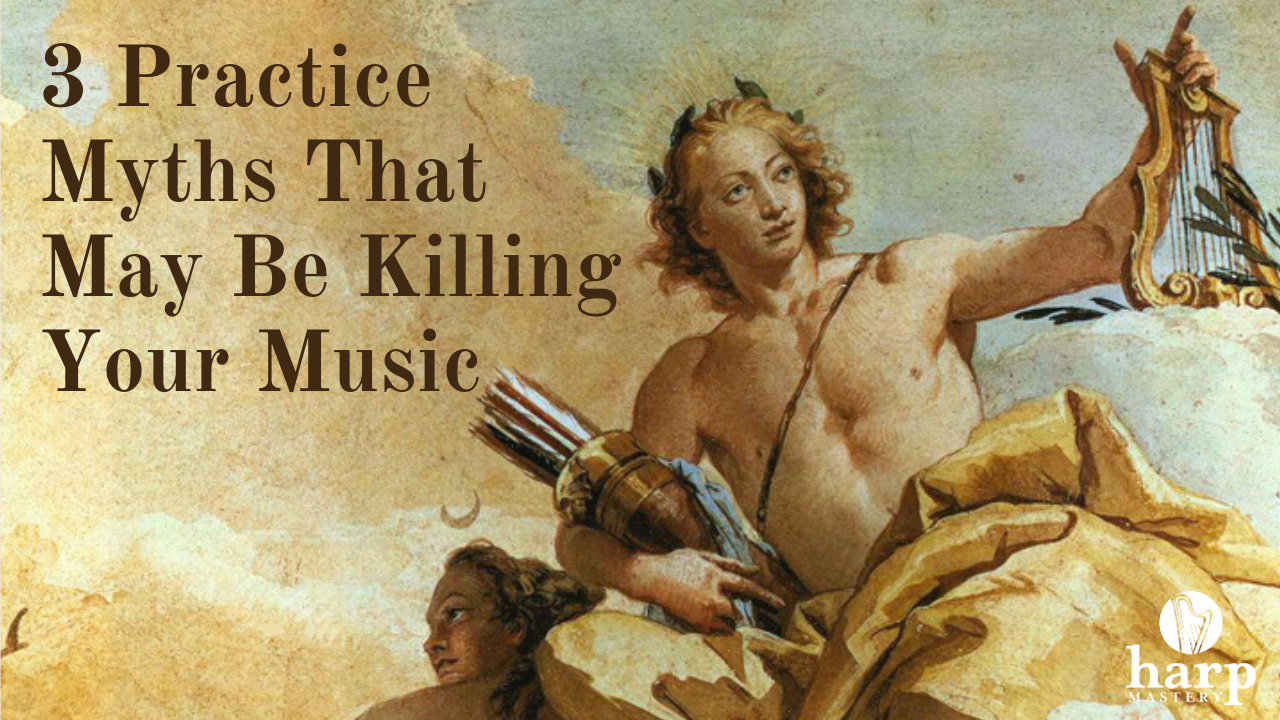3 Practice Myths That May Be Killing Your Music

I gave up on the “practice makes perfect” idea years ago.
In my experience, it doesn’t matter how long, how diligently or how much you practice; “perfect” is not a guaranteed result. Musicians who persist in pursuing perfection face inevitable disappointment and frustration. The common alternate version of this saying, “Perfect practice makes perfect,” is even more misleading.
As false as it is,“practice makes perfect” has been part of our lexicon since the 1500’s. I hope that in our more enlightened age every harpist knows that perfection is not a reasonable goal.
There are still plenty of other misconceptions about practice, however. I have known many harpists struggle needlessly because of them. These half-truths may not be wrapped in pretty “practice makes perfect” alliteration, but they are powerful enough to make you dread your practice or feel that playing the way you want will always be beyond your ability.
I’ve identified three practice myths that are unfortunately often passed on as fact. Like many myths there is a kernel of truth at the core that lends them credibility, and in fact, most of us have believed these at some point; I know I did. My hope is that you, like me, might learn the facts about practice so you can disregard the myths and start playing music beautifully and enjoying it.
MYTH: When it comes to practice, more is better.
FACT: While more practice can help, the better strategy is to practice the right way. Your practice time will only yield the results you want if you are concentrating on what you are doing. If you practice too long, past the point when you can concentrate clearly, your practice will be valueless, or possibly even detrimental.
The ideal practice habit is more like a steady, constant drip, rather than a seasonal flood. You should practice regularly, preferably every day or at least 4 to 5 days per week. Regular practice even if you can only do 15 minutes some days is the key to progress. However, if you’re planning on a long practice session be sure to take a 10 minute break away from the harp every hour to stand up, stretch and clear your mind.
MYTH: Practicing that passage the same way each time will make it bulletproof.
FACT: The truth is that practicing a passage or piece in a variety of ways not only gives you the flexibility you need to overcome the unexpected or the stressful things, but it helps you know it better. Security in your playing comes from knowing a piece inside and out, backwards and forwards, slow and fast, soft and loud. The more you change it up, the better you will know it. Plus, when you practice bringing that extra level of intention to your playing, the easier you will find it to stay in the moment in performance. You will be much less likely to go on autopilot which is the surest path to self-destruction.
MYTH: You can “fix” something in your practice.
FACT: Music is not something you can fix once and never worry about again. Music is a creation of the moment and therefore inherently unpredictable. In your practice you can discover more, understand more, become more familiar with a piece, but there is no “once and done” solution in music. It is a process; security comes only over time. We have a sense of accomplishment from conquering that passage in our practice today, but that doesn’t guarantee that the passage will work as well tomorrow. It takes time to achieve lasting results. Being patient with the process and ourselves is paramount.
How will you redesign your practice based on the facts outlined above?
Let us know in the comments!
50% Complete
Two Step
Lorem ipsum dolor sit amet, consectetur adipiscing elit, sed do eiusmod tempor incididunt ut labore et dolore magna aliqua.